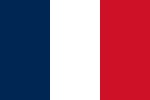Corruption in France describes the prevention and occurrence of corruption in France.
France has ratified several important international anti-corruption conventions such as the OECD Convention on Combating Bribery of Foreign Public Officials in International Business Transactions and the United Nations Convention against Corruption. In general, investors do not consider corruption a problem for doing business in France, and companies operating in France generally have a good reputation of corporate social responsibility.
The French National Assembly have proved two bills for combating tax evasion. However, in recent years there are several corruption scandals involving high-ranking public officials. Public works and the defence industry are considered the most affected by corruption.
Transparency International's 2023 Corruption Perceptions Index scored France at 71 on a scale from 0 ("highly corrupt") to 100 ("very clean"). When ranked by score, France ranked 20th among the 180 countries in the Index, where the country ranked first is perceived to have the most honest public sector. For comparison with worldwide scores, the best score was 90 (ranked 1), the average score was 43, and the worst score was 11 (ranked 180). For comparison with regional scores, the highest score among Western European and European Union countries was 90, the average score was 65 and the lowest score was 42.
Extent and perceptions
In 2011, Transparency International concluded in its annual report for 2011 that France does not do enough to stop corruption. A TNS Sofres poll in October 2011 indicated that 72% of the French public had the perception that politicians are corrupt.
In France in 2009 all major foreign investors and exporters and more than 80 per cent of surveyed executives admitted to 'not being familiar at all' with one of the most important legal frameworks in global business. A cartel constitutes a crime punishable by imprisonment and/or fines. Staff and budgets for public enforcement of securities regulation was a one third in France compared to UK in 2008.
Areas
Elections
Political corruption studies include the presidential campaign 2007 finance investigation in the value of €150,000 from Liliane Bettencourt to Nicolas Sarkozy. The maximum individual support is €4,600. Jacques Chirac was accused of using public funds for his election campaign in Paris in the 1990s. On 15 December 2011, Chirac was found guilty and given a suspended sentence of two years. He was convicted of diverting public funds, abuse of trust and illegal conflict of interest.
The suspended sentence meant he did not have to go to prison and took account of his age, health, and status as a former head of state. He did not attend his trial since medical doctors deemed that his neurological problems damaged his memory.
Bribery
Bribery investigations from Africa to France are ongoing, including bribery claims of Jacques Chirac, Dominique de Villepin and Jean-Marie Le Pen bribery claim from Gabon ex-president Omar Bongo. In September 2011 was judged Bernard Granie of 300 000 bribery from Provence Recyclage.
Energy sector
Alstom has been under investigation in France and Switzerland for allegedly making improper payments of US$200 million for contracts for Brazil's Itá hydroelectric plant, for São Paulo's subway expansion and for other major works in Venezuela, Singapore and Indonesia. The Mexican government has penalised Alstom and in 2007 the European Commission's antitrust authority fined Alstom €65 million for price fixing with competitors.
See also
- Corruption scandals in the Paris region
- List of French political scandals
- Police corruption in France
General:
- Crime in France
- International Anti-Corruption Academy
- Group of States Against Corruption
- International Anti-Corruption Day
- ISO 37001 Anti-bribery management systems
- United Nations Convention against Corruption
- OECD Anti-Bribery Convention
- Transparency International
Notes
- Austria, Belgium, Bulgaria, Croatia, Cyprus, Czech Republic, Denmark, Estonia, Finland, France, Germany, Greece, Hungary, Iceland, Ireland, Italy, Latvia, Lithuania, Luxembourg, Malta, Netherlands, Norway, Poland, Portugal, Romania, Slovakia, Slovenia, Spain, Sweden, Switzerland, and the United Kingdom
References
- "Snapshot of the France Country Profile". Business Anti-Corruption Portal. GAN Integrity Solutions. Archived from the original on 10 November 2013. Retrieved 17 November 2013.
- "2013 Investment Climate Statement - France". The US Department of State. The US Department of State. Retrieved 17 November 2013.
- "The ABCs of the CPI: How the Corruption Perceptions Index is calculated". Transparency.org. 20 December 2021. Retrieved 13 April 2024.
- "Corruption Perceptions Index 2023: France". Transparency.org. Retrieved 13 April 2024.
- "CPI 2023 for Western Europe & EU: Rule of law and political integrity threats undermine action against corruption". Transparency.org. Retrieved 13 April 2024.
- "Corruption watchdog says France could do better", Radio France Internationale, September 6, 2012.
- "Bad smells", The Economist, October 1, 2011.
- ^ Global Corruption Report 2009 Archived 2011-03-03 at the Wayback Machine, Corruption and the Private Sector, Transparency International August 2009
- ^ Korruptio mädättää Ranskaa HS 7.11.2011 B4 (in Finnish)
- ^ "French ex-President Jacques Chirac guilty of corruption". BBC. 15 December 2011. Retrieved 15 December 2011.
- "Jacques Chirac found guilty of corruption", Guardian, 15 December 2011.
| Corruption in Europe | |
|---|---|
| Sovereign states |
|
| States with limited recognition | |
| Dependencies and other entities | |
| Other entities | |
External links
- France Corruption Profile from the Business Anti-Corruption Portal
